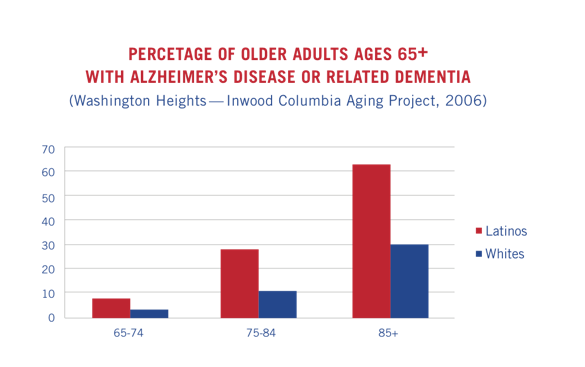I remember the day I graduated from college like it was yesterday. My family flew in from our small town in South Texas to watch me become the first person in our family to graduate from college. The look on my mother’s face as I walked across the stage on that sunny DC day will be with me forever…or at least I hope it will. Memory is more fragile than we think, particularly for Latinos.
While not widely known, Latinos are 1.5 times more likely than non-Hispanic whites to get Alzheimer’s, a progressive brain disease that slowly destroys memory and thinking skills and is ultimately fatal. According to researchers, Alzheimer’s disease contributes to the deaths of approximately 500,000 Americans each year, and unlike cancer or heart disease, it’s the only leading cause of the death that can’t be prevented or slowed.

Latinos are disproportionately represented in the older age groups most at risk for Alzheimer’s disease. Between 2008 and 2030 the Latino population aged 65 and older will increase by 224 percent compared to 65 percent increase for whites. (Greenberg/AOA, 2009)
While Alzheimer’s disproportionately impacts Latinos, low levels of awareness and high levels of stigma represent significant barriers to diagnosis and care. LatinosAgainstAlzheimer’s, a network of UsAgainstAlzheimer’s, was launched to address these barriers and to help cultivate a culture of brain health among minorities.
It’s critical for Latino older adults and their families to become familiar with Alzheimer’s symptoms and risk factors. According to UsAgaisntAlzheimer’s strategic partner the Mayo Clinic, people with Alzheimer’s may:
- Repeat statements and questions over and over, not realizing that they’ve asked the question before
- Forget conversations, appointments or events, and not remember them later
- Routinely misplace possessions, often putting them in illogical locations
- Eventually forget the names of family members and everyday objects
To learn more about the symptoms of Alzheimer’s, check out this resource from the Mayo Clinic.
Additionally, it’s important for Latinos to understand the cognitive health benefits available to them through programs like Medicare. For example, Medicare covers an annual screening for cognitive impairment without a copay for beneficiaries. Learn more about the benefit here.

As the Latino community ages rapidly over the next 15 years and beyond, it is essential for families to start thinking about brain health in the same way they think about diabetes prevention, heart disease, and other chronic diseases that plague the Latino community. After all, aren’t the memories we build with our friends and families worth fighting for?
The opinions expressed in this article are those of the author and do not necessarily reflect those of the Diverse Elders Coalition.

